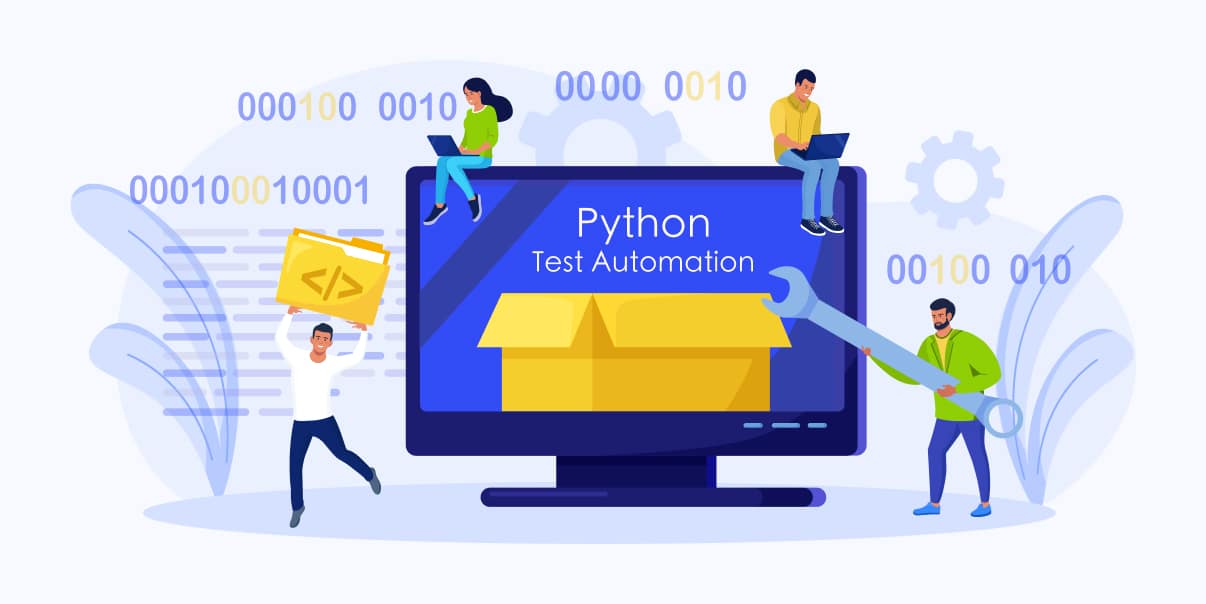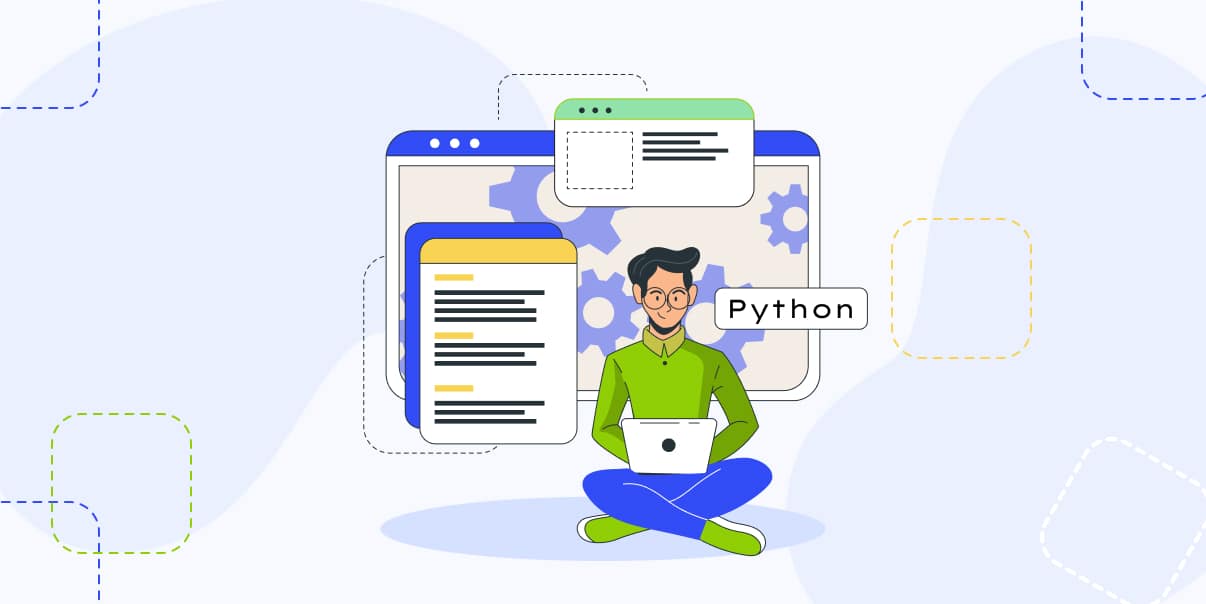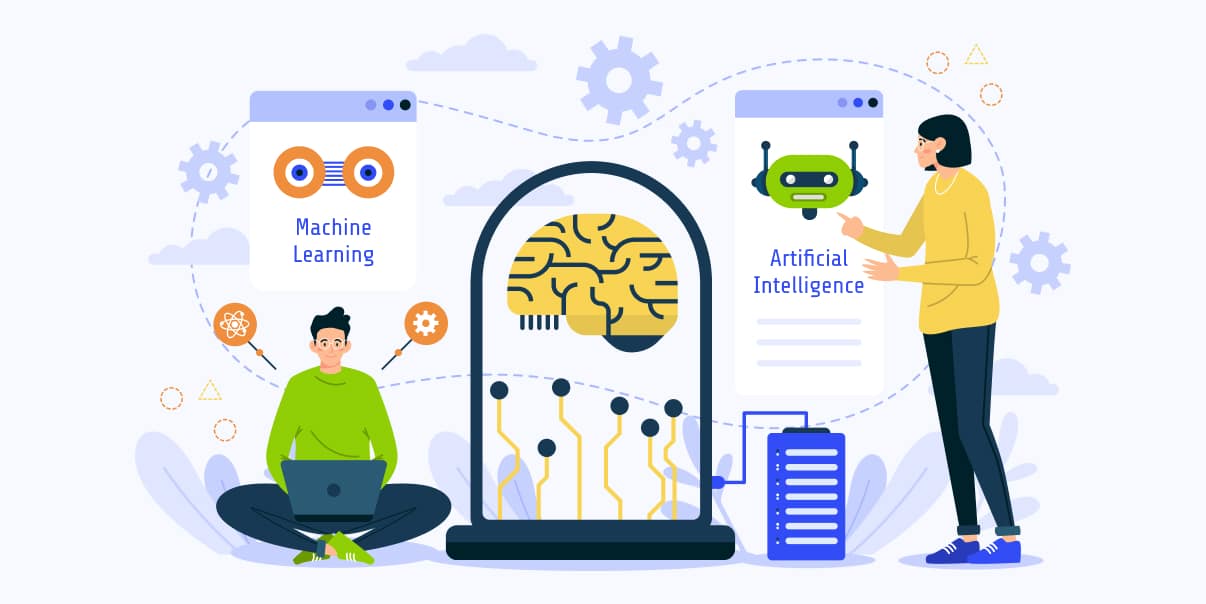How To Use AI in Software Testing: Functions, Benefits, and Tools
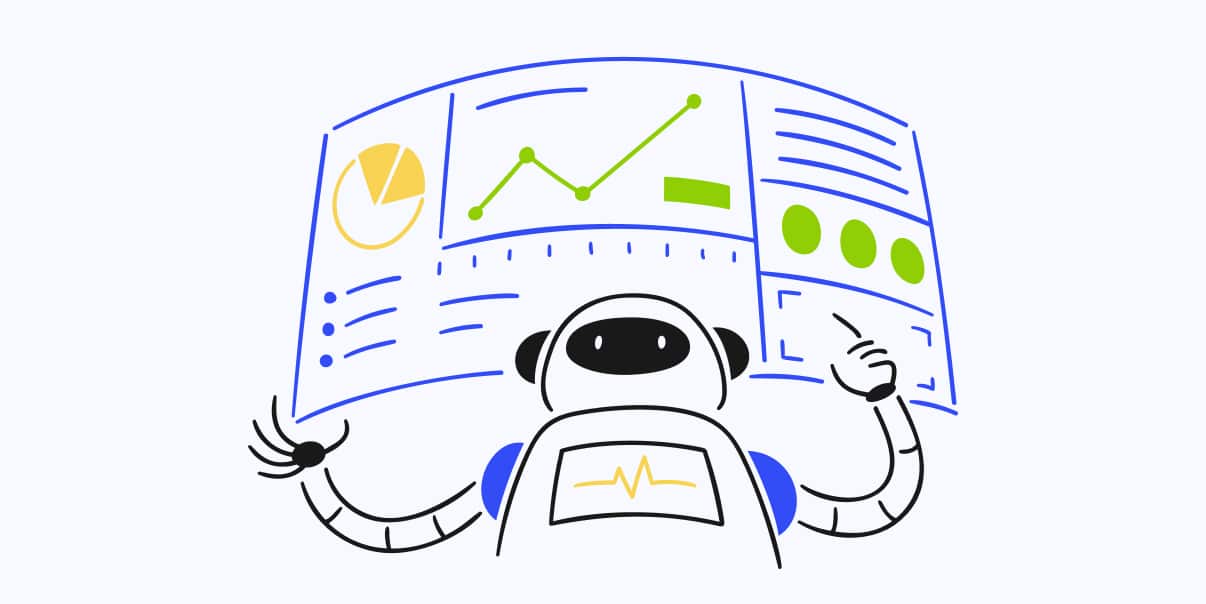
Artificial Intelligence (AI) has a vast potential to revolutionize software testing and test automation, contributing to digital transformation. Test automation can help organizations reduce the time spent on manual testing and increase their overall efficiency. It also offers a range of other benefits, such as improved accuracy, cost savings, faster results, and better scalability. But what is the actual function of AI in software testing, and how can you use it?
This article will discuss how you can leverage artificial intelligence (AI) in software testing. We will also talk about the benefits of AI for automation testing. You can also learn about the tools you can use to get started.
The Role of AI in Software Testing
In 2021, about 2 million mobile apps were already available worldwide. This number is continuously increasing up to this day.
To keep up with the market standard for software quality, you must use an efficient automation testing system to ensure an efficient product. But, a manual app test could take a lot of time and money for developers and companies. It is where AI could be highly beneficial.
Some development companies have been using AI in software testing since 2012. Google used it to test its search engine, and many other companies followed suit. Today, about 57% of companies use AI tools in their quality assurance and software tests. But why?
AI-based tools automate manual software tests and can recognize trends in data that a human may miss due to time constraints or other limitations. It also provides a way to create test scenarios quickly, saving manual testing time and money. Automated tests also make it easier to test a more significant number of applications and devices.
In addition, AI can generate test scripts, create regression tests, automate test execution, and more. AI-based tools can also detect a wide range of application issues. It provides a more accurate idea of how the software works in various environments. For example, AI-based tests can see unexpected behaviors due to environmental changes or new features introduced in updates.
Benefits of Using AI in Test Automation
AI software testing provides a range of benefits compared to manual testing. Here are some of them:
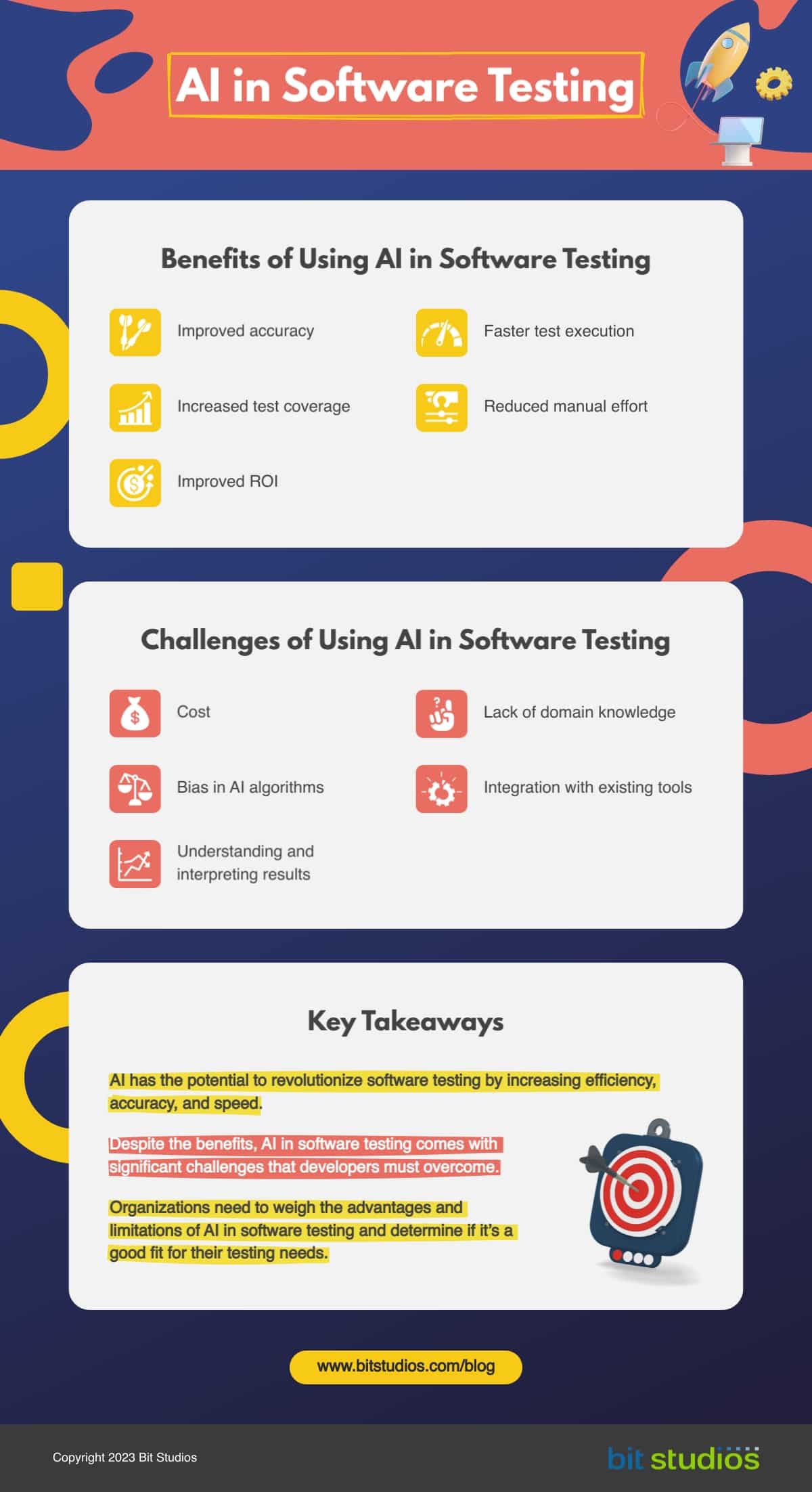
Codeless Testing
AI-based test automation requires no coding, making it a quick and easy way to start. The software can generate scripts for you automatically. Its machine learning can also run a full suite of tests without manual intervention.
Faster Time-to-Market
Using AI-based test automation reduces the time it takes to test a software application, allowing for a faster time-to-market. Machine learning also allows you to try more applications and devices in a shorter amount of time.
Better Testing Coverage
AI-based test automation can cover a broader range of application features and many devices. The result is that you get a more thorough test and a better understanding of how the software works in various environments, leading to a higher-quality product.
Cost Efficiency
You can save more money using AI software testing as it reduces the cost of manual testing. AI tools can test many software applications quickly, so you don’t need to spend more time on 80% of repeated processes. In simple terms, AI makes automation more efficient and cost-effective than manual testing.
Indeed, automation will reduce the time, resources, and effort invested into the process without sacrificing quality.
Boost Accuracy
AI-based test automation can detect a wide range of software issues. It also removes the need for manual testing, which can be time-consuming and tedious. This approach helps improve a software product’s accuracy and reliability, increase testing speed, and reduce the chances of a faulty software release.
Enhanced API testing
API testing check’s the software’s Application Programming Interface (API) to ensure it works correctly. It tests the connection between two systems and provides accurate data passing between them.
AI can help make API testing faster, more accurate, and cheaper. It can automatically create test scripts and detect many issues a person might miss. It also helps ensure that a software product will work how it is supposed to when it is released.
Continuous Testing
AI-based test automation allows for a continuous testing process, ensuring that a software product is of high quality at all times. It helps to reduce the risk of a faulty software release. It makes it easier to keep up with a rapidly changing software landscape.
AI-driven Testing Approaches
AI-driven testing approaches rely on machine learning and deep learning technologies to optimize test execution and provide a more comprehensive view of a software system’s performance. This approach allows software teams to identify better potential issues, risks, and opportunities in a quickly changing software landscape.
Here are the different AI-driven testing approaches you can try:
Automated Regression Analysis
Automated regression testing focuses on optimizing the regression tests a team needs to perform. It also provides a more detailed view of a software system’s performance.
Creating a set of regression tests can increase a software test’s speed and accuracy. It also helps teams identify potential problems, risks, and opportunities faster through automated data collection and analysis. Moreover, this approach can reduce manual testing time by automating specific tasks. It includes test script generation, test case execution, and report generation.
One crucial advantage of this approach is that you can use it in any testing environment. It makes it ideal for teams that need to test a variety of applications or different platforms quickly and accurately. In addition, this automation approach provides an easy way to integrate existing manual tests into automated ones. You don’t even have to rewrite them or start from scratch.
Defect Analysis and Prediction
Defect analysis and prediction is a testing approach powered by artificial intelligence (AI) that uses machine learning and deep learning technologies to optimize test execution. This AI-driven testing approach helps software teams identify potential issues, risks, and opportunities in a rapidly changing software landscape.
Moreover, a defect analysis and prediction approach provides a higher level of accuracy by automating a more comprehensive range of tests. It automates tasks such as test script generation, test case execution, and report generation. This method helps software teams reduce manual testing time, saving time and money.
Self-healing Automation
The self-healing automation approach helps software teams detect and fix any issues a software application may have. It can automatically detect a wide range of problems and offer a solution to the problem. An example of this is a code patch or an updated configuration file.
AI enables a team to quickly identify software issues, fix them before product launch, and identify potential errors earlier in the development process for a faster time-to-market.
Unlock Efficient Processes with AI Testing Tools
Below are a few popular AI-based tools used for test automation:
Test.AI
Test.AI is ideal for software teams that need to test a wide range of devices quickly and accurately. It also provides a comprehensive view of a software system’s performance by combining machine learning, deep learning, and AI technologies.
Pros:
- Increased accuracy and efficiency in automated testing
- Reduced cost and faster test cycles
- Greater modularization for easier maintenance
Cons:
- Potential difficulty integrating with existing systems
- Possibility of errors
Testim
Testim automates test scenarios using AI technology to generate reliable test cases with minimal manual intervention. It can also detect regressions in a software system quickly and accurately. It increases the test accuracy compared to manual tests.
Pros of Testim include:
- Increased speed of development
- More realistic end-user scenarios for testing
- Easier collaboration between QA engineers and developers
Cons of Testim include:
- Limited support for specific technologies and frameworks
- Potential difficulty integrating with existing systems and teams
UI Path Test Suite
With UI Path Test Suite, you can use AI technology to create test scenarios and analyze data. It helps software teams quickly identify potential issues in a software system, reducing the risk of a faulty product launch.
Pros:
- A comprehensive set of test automation features
- Easy to use drag and drop interface for creating tests
- Intuitive scripting language for writing custom extensions
- Data-driven testing with integration across multiple systems
Cons:
- Limited flexibility compared to other tools like Selenium
- Little support if there are issues
Sofy.AI
Sofy.AI is a test automation platform that uses AI to generate test cases and execute them quickly and accurately. The software also offers a range of features, such as test data generation, a self-healing system, and a defect-tracking module.
Pros:
- Natural Language Processing (NLP) for better search accuracy and faster results
- More realistic end-user scenarios based on customer feedback
- Improved accuracy in bug detection and other issues
Cons:
- Limited compatibility with specific technologies and frameworks
- Higher cost compared to other testing tools
Tricentis Tosca
Tricentis Tosca helps software teams quickly detect a wide range of issues in a software system. It can also create a comprehensive set of tests with minimal manual intervention.
Pros:
- Advanced analytics for better reporting
- Integration with a wide range of popular testing tools
- Ability to manage distributed test environments
Cons:
- Limited flexibility and scalability
- High initial costs
Launchable
Launchable uses AI technology to help software teams quickly detect a wide range of issues in a software system. It enables developers and QA engineers to create comprehensive tests with minimal manual intervention. You can also run them on a large scale across multiple platforms.
Pros:
- Generate test scripts automatically
- Broad test coverage
- Self-healing capabilities
Cons:
- Difficulty integrating with existing systems and teams
- Limited support for specific technologies and frameworks
Parasoft
Parasoft creates a comprehensive set of tests with minimal manual intervention. It also provides a more accurate view of a software system’s performance in various environments.
Pros:
- Analytics for better reporting
- Integration with a wide range of popular testing tools
- Visual testing
Cons:
- Higher initial costs compared to other testing tools
- Limited flexibility and scalability
Master Software Testing with AI: Tips for Success
Now that you know its functions and tools, let’s look at a few helpful tips for effectively using AI in software testing. By following a few key considerations, your team can ensure that your software tests are accurate and efficient.
1. Have a well-defined set of goals for your team
Before adopting a test automation approach powered by AI, you must have a clear set of goals and objectives. This way, you know what to accomplish with the automation platform. It can help ensure that the software testing project goes as smoothly as possible.
2. Review your existing software requirements
Reviewing all software requirements before introducing a test automation tool into a system is essential. It helps prevent potential issues from mismatches between a system’s current capabilities and an automated testing tool’s features.
3. Invest in a good training program
Training teams on properly using an AI software tests platform will help them get up to speed quickly and easily. Investing in a good training program and resources is essential so teams can use the tool effectively.
4. Consider a hybrid testing approach.
AI-driven tests can be a great tool, but there are more than one-size-fits-all solutions. Consider a hybrid testing approach combining manual and automated tests to get the best results. It helps ensure a higher accuracy level and a better understanding of how the software works in various environments.
5. Monitor your team’s progress
It will help if you track your team’s progress using an AI software testing platform. Ensure that your team completes tasks on time. You should also provide regular feedback on the team’s performance. This step will help you stay on track and keep the highest quality of your software product.
Conclusion
AI-based software testing can provide various benefits, from codeless testing to faster time-to-market and improved accuracy. AI tools have the potential to reduce manual test costs significantly. Also, it can provide a more comprehensive view of a software system’s performance in various environments. By following the tips above, you’ll be able to improve your AI testing process.
But if you’re having difficulties building a testing team with AI skills, BIT Studios is here to help. We can provide you with essential insights with our software QA consulting. We also offer accurate software testing services for our clients.
AI in Software Testing FAQs
How can I implement AI in test automation?
A variety of tools can implement AI automation testing. These include Test.AI, Testim, UI Path Test Suite, Sofy.AI, Tricentis Tosca, Launchable, and Parasoft SOAtest. They provide a range of features that help software teams quickly detect various issues in a software system. It also reduces manual testing time while ensuring a high-quality product.
Is there a cost difference between manual and automated tests using AI technology?
Yes, a cost difference exists between manual and automated tests using AI technology. They also significantly reduce manual testing time, leading to a reduction in costs overall. Additionally, software testing AI tools require no coding. It makes it quick and easy to test a software application or device. Companies will save money by reducing the need for coding skills on a test team.
Can I integrate existing manual tests into automated ones using an AI tool?
You can integrate existing manual tests into automated ones using an AI tool. Many software test automation tools provide a drag-and-drop interface that makes it easier to transition from manual testing to a more automated approach. They also offer a range of features, such as test script generation, test case execution, and report generation, that make integration smoother. Furthermore, many of these tools require no coding, making them a quick and easy way to start automating tests.
We’re BIT Studios!
At BIT Studios we specialize in designing, building, shipping, and scaling beautiful, usable products with blazing-fast efficiency

